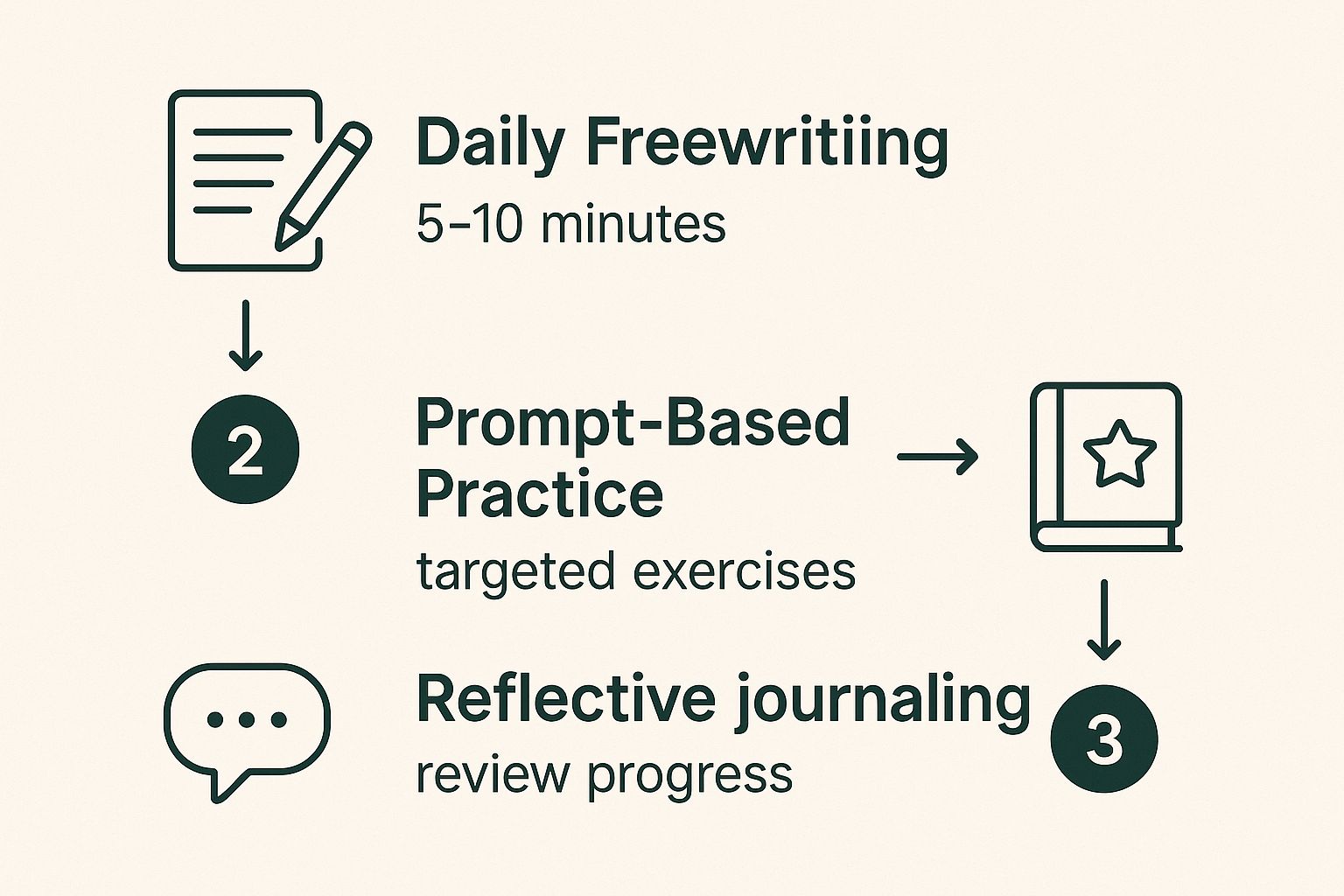Improving your writing skills really just comes down to three things: reading like a writer, practising consistently, and seeking out honest feedback. If you can focus on these areas, you’ll transform your ability to communicate clearly and persuasively, turning a common challenge into a real personal and professional advantage.
Why Better Writing Skills Matter More Than Ever
In a world filled with constant digital noise, being able to write clearly isn't just a "nice-to-have" skill—it's a superpower. We're all bombarded with information, from quick emails to detailed reports. The messages that actually cut through the chaos are always the ones that are well-crafted, logical, and easy to understand. At the end of the day, strong writing skills are a direct reflection of strong thinking skills.
This isn’t about becoming a bestselling author overnight. It’s about gaining a genuine advantage in your studies, your career, and even your day-to-day communications. When you master the art of writing, you gain the power to share your ideas with confidence and precision, making sure you’re heard and respected.
The reality is, when you learn how to improve writing skills, you aren't just learning to arrange words on a page. You are learning how to organise your thoughts, build a convincing argument, and connect with your reader on a meaningful level.
This guide is designed to move past the generic advice you’ve heard a thousand times. We’re here to give you a practical, step-by-step roadmap to build both your confidence and your capabilities.
A Growing Opportunity For You
Recent trends actually show a noticeable dip in writing proficiency across the board, which presents a massive opportunity for anyone willing to put in the effort. For instance, Australia's national assessment program, NAPLAN, revealed a significant decline in student writing abilities over the last decade, especially in persuasive writing. This trend was even more pronounced in secondary school students. You can see a full analysis of these writing development trends in this report from the Australian Education Research Organisation.
This isn’t meant to be discouraging; it’s a sign that high-quality writing is becoming rarer and, because of that, much more valuable. By deliberately working on your skills, you immediately set yourself apart. The benefits go far beyond just getting better marks:
- Academic Success: Craft compelling essays and reports that clearly show what you know.
- Career Advancement: Write persuasive emails, proposals, and presentations that actually influence decisions.
- Personal Confidence: Express your thoughts and opinions with clarity, earning trust and credibility along the way.
This guide will give you the framework to turn a common weakness into your personal strength, equipping you with the tools you need to communicate effectively in any situation.
Building Your Writing Foundation from the Ground Up

So many people think that great writing means using big, impressive words and complicated sentences. But really, it all comes down to one thing: clarity. To genuinely lift your writing game, you have to get back to basics. It starts with solid grammar, a rich vocabulary, and learning to see things from your reader's point of view.
Think of grammar not as a set of stuffy rules, but as the scaffolding that holds your ideas together. When your writing is clean and error-free, your message shines through, which immediately builds trust with your audience. It proves you care enough to get it right.
This whole process begins with a simple, yet incredibly powerful habit: reading with a writer’s eye. Don’t just read for the story or the facts; start paying attention to how the author is doing it. Notice their sentence structures, how they introduce ideas, and the way they guide you smoothly from one paragraph to the next.
Become an Active Reader and Observer
The next time you finish an article or a book chapter, pause for a moment. Instead of just moving on, ask yourself a few key questions:
- What was the author’s main message here?
- How did the introduction hook me in?
- Were there any sentences that really stood out, and why did they work so well?
- Can I boil the entire piece down into just two or three sentences?
Breaking down writing like this trains your brain to spot what works, making it so much easier to use those same techniques in your own work. It’s a small mental shift that can make a massive difference.
A writer who doesn't read is like a chef who doesn't eat. You need to constantly immerse yourself in well-crafted material to understand what excellence looks and sounds like.
Here’s another practical exercise: start a habit of hunting for awkward or confusing sentences in your daily life. You’ll find them everywhere—in work emails, news articles, even social media posts. Challenge yourself to rewrite them to be clearer and more direct. This simple practice sharpens your editing instincts and helps you catch weak spots in your own drafts.
Grow Your Vocabulary the Natural Way
Yes, a strong vocabulary is important, but it's not about memorising a thesaurus. The best way to learn new words is to find them in their natural habitat—in context. Make a point of reading widely, from different genres of fiction to articles on topics you know nothing about.
When you stumble across a new word, don't just look up the definition. See how it’s being used in that specific sentence. This helps you grasp its subtle meaning and feel confident using it yourself without sounding forced or unnatural.
Nurturing this kind of curiosity for language is a huge part of becoming a better writer. For parents and tutors supporting younger students, encouraging a passion for learning is the perfect way to build these foundational habits for life. By making these practices part of your routine, you’re building a solid base that all your other writing skills will stand on.
Developing a Consistent Writing Practice That Sticks
Knowing you should practise your writing is easy. Actually building a habit that delivers real results? That’s a whole different story. We've all been there – a burst of motivation followed by weeks of nothing. But sporadic effort only ever leads to sporadic improvement.
To see genuine progress, you need to shift from just 'practising' to what's known as deliberate practice. This isn't about staring at a blank page for hours, waiting for inspiration to strike. It’s about having a smart, structured system for yourself. One that helps you tackle specific skills, get useful feedback, and honestly review your own work to find and fix those weak spots. The goal is to build a reliable writing habit that you can see paying off.
This simple cycle shows how small, daily actions can create a powerful loop of improvement.

As you can see, the magic happens when you combine free-flowing writing with targeted exercises and consistent reflection. That’s what makes your growth sustainable.
Create Your Deliberate Practice Plan
A great plan is built on consistency. Forget trying to cram three hours of writing into a Sunday afternoon. It's much more effective to aim for short, frequent sessions. Just 15-20 minutes a day trains your brain to slip into "writing mode" more easily and builds momentum.
The trick is to give each session a crystal-clear purpose. Don't just sit down to "write". Instead, pick one specific skill you want to sharpen that day.
- For better clarity: Spend 15 minutes rewriting a few dense paragraphs from a news article. Your goal? Make them simpler and punchier.
- To improve flow: Take two completely unrelated ideas and write a short piece that connects them in a logical, natural way.
- To build descriptive skills: Choose an everyday object in your room—a coffee mug, a lamp—and describe it using as much sensory detail as you can muster.
This targeted approach turns practice from a chore into a focused workout. For students, mastering these small exercises is often the key to writing stronger, more convincing essays. If you’re looking for more ways to structure your arguments, these essay writing tips and tricks are a fantastic resource for applying these ideas to your school work.
Your Weekly Writing Improvement Plan
Here is a sample schedule to help you structure your practice using proven techniques. Just 15-20 minutes a day can make a huge difference.
| Day | Focus Area | Activity (15-20 minutes) | Goal |
|---|---|---|---|
| Monday | Sentence Structure | Rewrite long, complex sentences into shorter, clearer ones. | Improve readability and impact. |
| Tuesday | Vocabulary & Word Choice | Pick 3 overused words (e.g., 'good', 'nice') and find 5 synonyms. | Expand your expressive toolkit. |
| Wednesday | Flow & Transitions | Write a paragraph connecting two unrelated topics. | Practise creating smooth, logical bridges. |
| Thursday | Show, Don't Tell | Describe a scene or emotion without naming it directly. | Build vivid, engaging imagery for the reader. |
| Friday | Free Writing & Reflection | Write about anything for 10 mins, then spend 5 mins reviewing. | Combine creativity with self-assessment. |
| Saturday | Editing & Proofreading | Edit a piece you wrote earlier in the week. | Train your eye to catch your own errors. |
| Sunday | Rest & Read | Read something you enjoy, paying attention to the writing. | Absorb good writing by osmosis. |
This table is just a starting point. Feel free to customise it based on the skills you want to develop most. Consistency is what matters!
The Power of Feedback and Reflection
You can't improve what you don't measure. After each practice session, take just five minutes to read over what you’ve written. Ask yourself a few simple questions: Where did I get stuck? Which sentences feel clunky or awkward? What part am I most proud of? This habit of self-assessment is your first and most important layer of feedback.
True progress happens when you stop being your own biggest critic and start being your own most honest coach. Analyse your work with curiosity, not judgement.
This method of focused, reflective practice is incredibly powerful and backed by real-world results. By building your own structured plan, you're taking control of your development and setting yourself up for real, lasting improvement. You’ll be writing with more confidence and skill before you know it.
Mastering the Art of Structuring Your Ideas

Brilliant writing is about much more than just beautiful sentences. At its core, it’s about presenting your thoughts in a clear, organised way. A well-structured piece of writing takes your reader on a journey, guiding them effortlessly from one point to the next, making your message both easy to understand and compelling.
Without a solid framework, even the most amazing ideas can end up as a confusing mess. It’s like having a box full of LEGOs. You might have all the best bricks, but if you just tip them into a pile, you’ll never build anything impressive. You need a plan—a blueprint that shows where every single piece belongs. The exact same principle applies to your writing.
From Jumbled Thoughts to a Coherent Argument
Before you even think about writing that first sentence, you need to be crystal clear on what you want to say and the order you’ll say it in. This planning stage is often overlooked, but it’s the secret weapon for a smoother writing process and a much stronger final piece.
Your most powerful tool here is a simple outline. This doesn't have to be the rigid, multi-level monster you remember from school. It can be as straightforward as a few bullet points jotted down on a notepad. The real goal is to create a logical roadmap for your thoughts.
Here’s a practical way to get started with outlining:
- Nail down your core message. What’s the single most important thing you want your reader to walk away with? Write it down in one simple, clear sentence. This is your anchor.
- List your main supporting points. What are the key arguments or pieces of evidence you'll use to back up that core message? Aim for three to five solid points.
- Arrange them logically. Think about the flow. Should your points be in chronological order? In order of importance? Or maybe a problem-solution structure works best? Move them around until the sequence feels natural and makes sense.
This quick exercise forces you to think critically about your argument before you get bogged down in wording. It’s a fundamental step in improving your writing skills because it shifts the focus from just words to the actual ideas behind them.
Good writing is a mirror of clear thinking. The act of structuring your ideas on paper is one of the best ways to refine what you actually believe and why.
The Underestimated Skill of Planning
We can't overstate the importance of these higher-order thinking skills—planning, organising, and evaluating. In fact, a lack of focus on these cognitive processes is seen as a key reason for Australia’s current writing challenges.
Recent analysis of a decade of NAPLAN data found that many Year 9 students are writing at a level closer to that of a Year 4 student. A big part of the problem is that writing isn't valued as the demanding mental task it truly is. You can learn more by exploring insights on what's contributing to Australia's writing crisis.
This really highlights a critical truth: to become a better writer, you first have to become a better thinker.
Once your outline is ready, you can start writing, using each point as a guidepost. This simple roadmap keeps you from veering off-topic and ensures every paragraph has a clear purpose. Your writing will immediately become more focused, your arguments will be more cohesive, and your message will be infinitely more powerful.
Practical Exercises and Tools to Sharpen Your Skills

Theory and planning are a great start, but real, lasting improvement only happens when you roll up your sleeves and get to work. Think of this section as your personal writing gym—a collection of focused exercises and handy tools designed to build your writing muscles, one rep at a time.
These aren't just abstract ideas; they're actionable habits you can start today. It's the consistent, focused effort that truly makes a difference and leads to tangible progress in your writing skills.
Build Fluency and Precision with Daily Exercises
Just like an athlete trains specific movements over and over, a writer needs to practise particular skills. The secret is to weave small, manageable exercises into your daily routine that target different parts of your writing.
A great place to begin is with daily journaling. This isn't about perfectly documenting your day, but about building fluency. Just spend ten minutes writing freely, without stopping to correct or edit yourself. This simple habit makes the act of putting words on a page feel much more natural and less daunting.
Another fantastic exercise is summarising articles. Find a news story or a blog post that interests you and challenge yourself to boil down its main points into one or two tight paragraphs. This forces you to get to the core of the message and express it with real clarity—an essential skill for any kind of writing. For more help with this, exploring how to increase your vocabulary can give you the precise words you need to be brief yet effective.
The goal isn't perfection; it's consistency. A little bit of focused practice every day will always beat long, infrequent cramming sessions.
For a more advanced workout, try rewriting poorly written examples. Hunt down a clunky email, a confusing set of instructions, or a dense academic paragraph. Your mission is to rewrite it for clarity, flow, and impact. This sharpens your editing eye and helps you instinctively spot and fix weaknesses in your own work.
Use Technology as a Coach, Not a Crutch
Online tools can be incredible allies in your quest to become a better writer, but only if you use them the right way. The goal isn't just to fix errors, but to actually understand them.
-
Grammar Checkers: Tools like Grammarly or the Hemingway App are brilliant for catching typos and grammatical slips. But instead of just clicking "accept" on every suggestion, take a second to understand why it's being made. Is it a run-on sentence? Have you used passive voice? This turns a simple correction into a valuable micro-lesson.
-
Style and Readability Tools: These apps can analyse your writing for things like sentence length variation and repetitive word choice. Use them to identify your own patterns. Do you tend to write long, complicated sentences? Do you rely on the same few adjectives? Becoming aware of these habits is the first step toward improving them.
The key is to treat these tools like a personal writing coach. They can point out where you're going wrong, but it’s up to you to learn from the feedback and strengthen your skills for next time.
The Power of a Writing Partner
One of the fastest ways to grow as a writer is to get a fresh pair of eyes on your work. Finding a writing partner or joining a small writing group provides the constructive feedback you need to see your own blind spots.
Be specific when you ask for feedback. Instead of asking, "Is this any good?", try something like, "Is my main argument clear in this section?" or "Does this paragraph flow logically from the one before it?" This focused approach gives you much more useful insights.
Giving feedback on their work will also sharpen your own analytical skills, making you a more critical and thoughtful editor of your own writing. This cycle of giving and receiving feedback is a proven way to accelerate your progress.
Common Questions About Improving Writing Skills
The journey to becoming a better writer always brings up a few questions. As you start putting the advice from this guide into practice, you’ll probably run into some specific hurdles or feel a bit uncertain. This section is here to give you clear, direct answers to the queries we hear most often.
Think of it as your go-to reference for getting over those roadblocks and keeping your momentum going. Building writing confidence is a process, and having answers ready can make a world of difference.
How Long Does It Take to See Real Improvement?
This is probably the question we get asked the most, and the honest answer is: it really depends on how much consistent, focused effort you put in. It’s a lot like learning an instrument or a sport—you won’t see huge changes overnight. But you absolutely can expect to notice small, encouraging wins within just a few weeks of dedicated daily practice.
For instance, if you commit to just 15–20 minutes of targeted writing exercises each day, you might find that forming sentences feels a little smoother or that you're catching more of your own typos.
Meaningful, lasting improvement—where writing with clarity starts to feel natural—typically takes several months of consistent work. The key isn't the total hours you clock, but the quality and regularity of your practice.
Remember, the goal is sustainable progress, not instant perfection. Make sure to celebrate the small victories along the way. They’re the building blocks of real, lasting skill.
Is It Better to Focus on Grammar or Creativity First?
This is a classic chicken-or-egg debate for anyone trying to improve their writing. Should you master all the rules before you try to be creative, or just let your ideas flow freely and worry about the technical stuff later?
From our experience, the most effective approach is to work on both at the same time, but with a slight initial focus on getting your ideas down clearly.
First, just get your thoughts onto the page without agonising over perfect grammar. This is your "creative" or "drafting" phase. Once your ideas are captured, you can switch hats and become the editor, focusing on the technical side of things.
- Creative Phase: Let your ideas flow. Don’t stop yourself mid-sentence to self-correct.
- Editing Phase: Go back and deliberately clean up your grammar, sentence structure, and word choice.
This two-step process lets you develop both sides of your writing brain. Over time, you'll find that good grammar and clear sentence structure become more automatic, which frees you up to be even more creative.
How Do I Know if My Writing Is Actually Getting Better?
Measuring your own progress can feel a bit tricky, but there are a few tangible ways to track your growth. It’s all about moving beyond a gut feeling and looking for real evidence that your writing skills are on the up.
One of the best methods is to keep a portfolio of your work. Save something you write when you first start, and then compare it to a piece you write three or six months down the track. You'll likely be genuinely surprised by the difference in your clarity, flow, and confidence.
Another fantastic indicator is feedback from others. Are your colleagues mentioning how clear your emails are? Are you getting better marks on your assignments? These are powerful signs that your hard work is paying off.
Feeling like you or your child could use some one-on-one guidance to accelerate these skills? Evergreen Tutoring Services provides personalised support for learners of all ages, from primary school to university and beyond. Our expert tutors can help you build a strong foundation and develop the confidence to write clearly and effectively. Find out how we can help at https://www.evergreentutoringservices.com.au.










